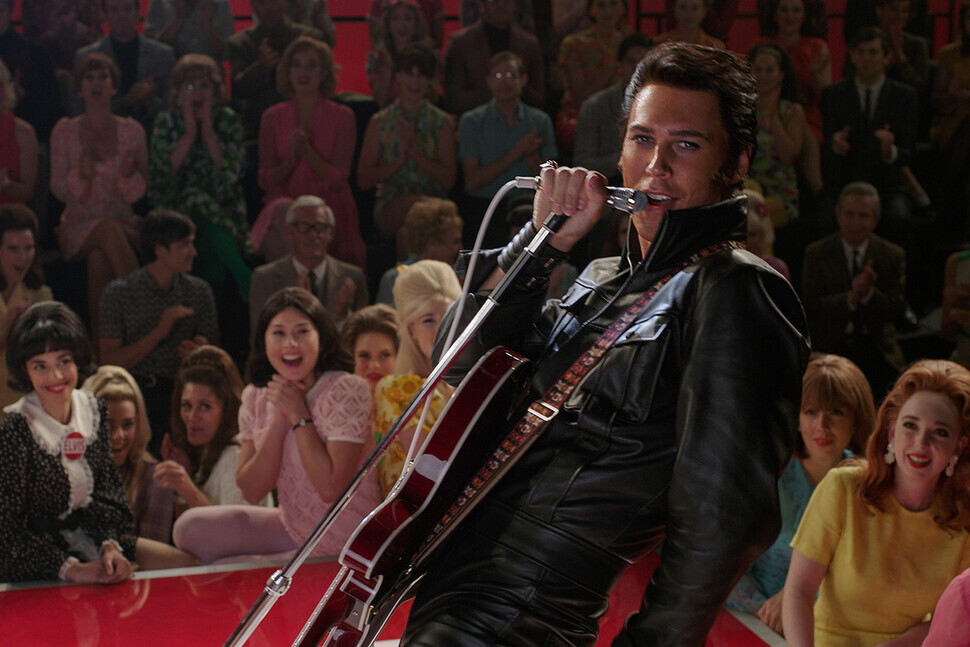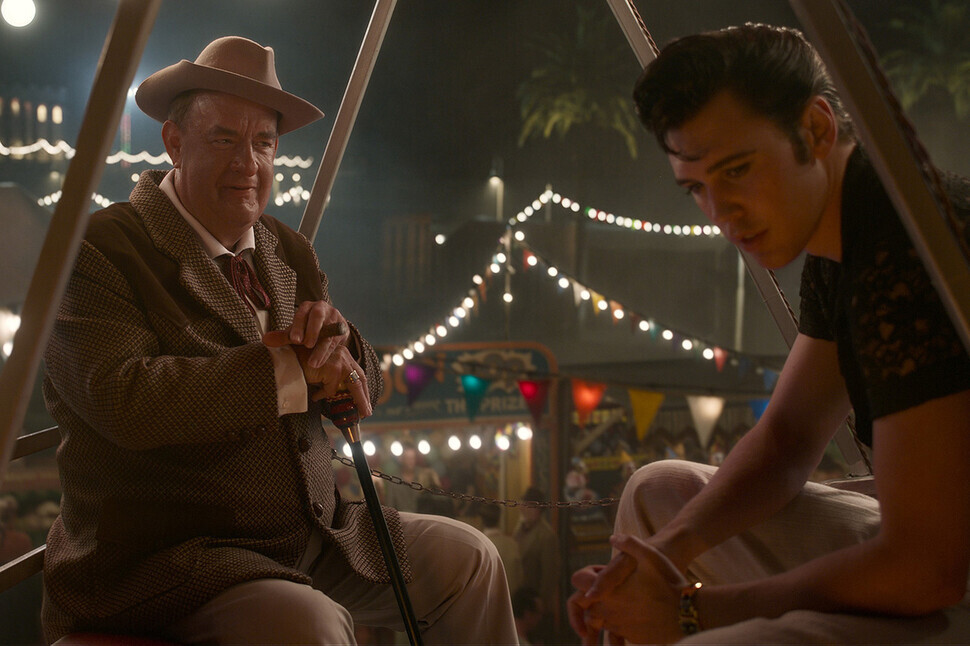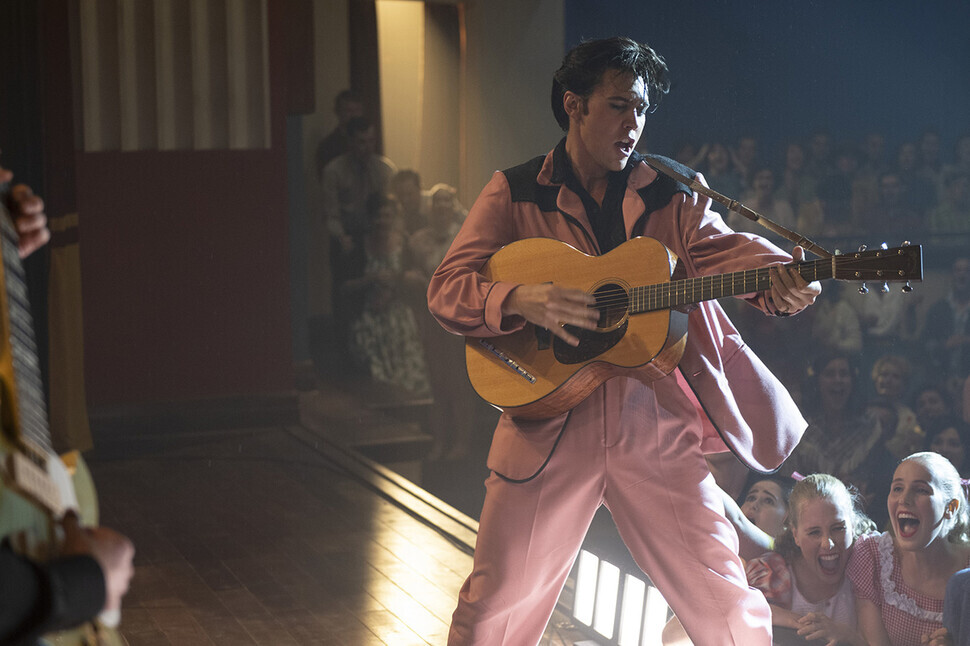hankyoreh
Links to other country sites 다른 나라 사이트 링크
What the K-pop industry can take away from “Elvis”

What do you picture when you hear the name Elvis Presley? I have a feeling a majority of readers would think of wax figures of the singer they encountered in museums, not images of the pop star singing on stage during his lifetime — at least in 2022 Korea. But now, that seemingly distant figure has come back to life on the screen.
We’re not in the US, nor is Presley Freddie Mercury from Queen — so why should Koreans welcome his return? Here’s one reason. The biopic is the newest film by Baz Luhrmann, director of masterful musical films such as Romeo and Juliet (1996) and Moulin Rouge (2001). Elvis, which hit local theaters on July 13, is a perfect entertainment film that leads viewers into a trance even if they aren’t knowledgeable about the eponymous singer’s life and music.
An “all-time legend” who was at his best throughout his 20-year musical career, from his debut in 1953 to 1977, when he died at the age of 42. A holder of a Guinness world record for being the recording artist with the most certified titles ever, having sold over 1 billion records worldwide. A superstar whose appearance on a TV show resulted in a rating of 82.6%, who captured 1.5 billion viewers in 40 countries across the world through the world’s first-ever concert broadcast live via satellite.
But putting these mind-boggling records aside and following the unexpected journey of a white boy raised in a poor, predominantly Black neighborhood will allow you to see how quickly 159 minutes can pass.
The interesting thing about Elvis is that the narrator of the film is not Presley himself but Tom Parker (played by Tom Hanks), the manager who turned Presley into the star that he became. Seeing potential in the unknown singer Presley (played by Austin Butler), who drives around on his truck while nurturing his dream of becoming a musician, Parker puts Presley on stage. Presley becomes a sensation with rock ‘n’ roll, infused with the rhythm he picked up through his friendship with Black friends, in a musical world where country music — a white genre — is the mainstream.

Despite the guilt they feel while shaking their hips and legs in dance, through Presley’s music, women become the Eve of Genesis who took a bite of the forbidden fruit. Presley encounters success after success, but soon he is met with vicious resistance. Attacks that accuse Presley of “doing vulgar music like Black people as a white person” spark racial tension as well. Parker attempts to whitewash Presley by forbidding him from dancing and dressing him in tuxedos. Presley refuses. Parker keeps trying to stifle Presley, who dreams of a larger world. Presley despairs and feels discouraged.
These scenes overlap with the reality of the K-pop industry, which is spreading its wings across the world. In fact, during a virtual event, Luhrmann explained why he made “Elvis,” saying that Presley was the progenitor of K-pop culture as it is today.
Luhrmann said he wanted to show that Elvis, who may seem old and outdated now, is no different from the young generation of today.

This also connects to the dark side of the entertainment industry. Presley is slowly brought to his ruin by Parker, who calculates everything based on monetary value. Regarding this, Luhrmann said he wanted to show that “putting too much weight on the business side of things eventually leads to the artist’s demise. This is something those in the Korean music industry should consider.”
Despite the weighty message, Elvis is a film that delights the eyes and ears from start to finish. Tom Hanks’ performance is spectacular as ever, while Austin Butler, a newcomer who was cast as the movie’s protagonist against heavy competition from Harry Styles, Ansel Elgort, and Miles Teller, is Presley himself.
Butler sang Presley’s songs himself, and Presley’s daughter Lisa Marie Presley reportedly said she mistook Butler’s voice for her father’s when she first watched the film. In the scene where Presley sings “Unchained Melody” in his last ever concert before his death, Presley’s actual voice is inserted into the film — at which point it becomes pointless for the audience to try to distinguish between what’s real and what’s a reenactment.
By Suh Jung-min, music correspondent
Please direct questions or comments to [english@hani.co.kr]

Editorial・opinion
![[Editorial] Penalties for airing allegations against Korea’s first lady endanger free press [Editorial] Penalties for airing allegations against Korea’s first lady endanger free press](https://flexible.img.hani.co.kr/flexible/normal/500/300/imgdb/original/2024/0502/1817146398095106.jpg) [Editorial] Penalties for airing allegations against Korea’s first lady endanger free press
[Editorial] Penalties for airing allegations against Korea’s first lady endanger free press![[Editorial] Yoon must halt procurement of SM-3 interceptor missiles [Editorial] Yoon must halt procurement of SM-3 interceptor missiles](https://flexible.img.hani.co.kr/flexible/normal/500/300/imgdb/child/2024/0501/17145495551605_1717145495195344.jpg) [Editorial] Yoon must halt procurement of SM-3 interceptor missiles
[Editorial] Yoon must halt procurement of SM-3 interceptor missiles- [Guest essay] Maybe Korea’s rapid population decline is an opportunity, not a crisis
- [Column] Can Yoon steer diplomacy with Russia, China back on track?
- [Column] Season 2 of special prosecutor probe may be coming to Korea soon
- [Column] Park Geun-hye déjà vu in Yoon Suk-yeol
- [Editorial] New weight of N. Korea’s nuclear threats makes dialogue all the more urgent
- [Guest essay] The real reason Korea’s new right wants to dub Rhee a founding father
- [Column] ‘Choson’: Is it time we start referring to N. Korea in its own terms?
- [Editorial] Japan’s rewriting of history with Korea has gone too far
Most viewed articles
- 160% of young Koreans see no need to have kids after marriage
- 2Presidential office warns of veto in response to opposition passing special counsel probe act
- 3Months and months of overdue wages are pushing migrant workers in Korea into debt
- 4[Editorial] Penalties for airing allegations against Korea’s first lady endanger free press
- 5Japan says it’s not pressuring Naver to sell Line, but Korean insiders say otherwise
- 630th anniversary Wednesday Demonstration pushed out of memorial site by far-right
- 7OECD upgrades Korea’s growth forecast from 2.2% to 2.6%
- 8Dermatology, plastic surgery drove record medical tourism to Korea in 2023
- 9Inside the law for a special counsel probe over a Korean Marine’s death
- 10[Special reportage- part I] Attending the funeral of the victim of a South Korean war crime in Vietn